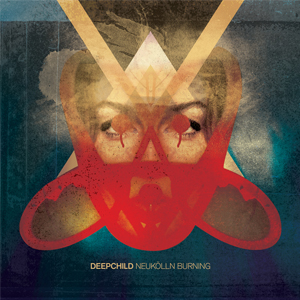Deepchild Neukölln Burning
Departure? Departure to where? If these questions were ever raised following the release of Rick […]

Departure? Departure to where? If these questions were ever raised following the release of Rick Bull’s (a.k.a. Deepchild) last LP, Departure, they’ll certainly be answered by Neukölln Burning, his latest. Separated by a five-year gap, the space between the two albums saw the producer leave his native Australia for the comparatively colder climate of Berlin. Yet beyond just physical relocation, it seems as though a personal journey has been taken as well. Shifting away from the tech-house sonic design of Departure, Bull’s latest feels like an attempt to convey a very specific moment in time, along with the feelings, people, and spaces involved.
That moment, or period rather, is a particularly dark passage in Bull’s life. He’s said that the record was recorded in the dead of winter while tapering down from a life spent on anti-depressants. Violent mood swings, panic attacks, and a feeling of grasping at sobriety intermingle with the ghostly passage of both space and time he experienced as a travelling DJ. It’s all connected by a pervasive heaviness, the characteristic density that defines much of the techno from the German capital.
Much like the city it evokes, it’s a network of almost non-linear moments of happening buffered by areas of stillness. Even the more driving songs get across a sense of concentrated activity in a larger unfilled space. Immediately, with “Bleeding Down the Night,” we’re introduced to a contrast between a mournful, pitched-down soul sample weaving around a corridor of driving techno, itself punctuated with a contorted twisting of circuitry. Echoes of the damp environments of old UK dubstep soak into the mostly beatless “Chicago Train,” the record’s first interlude, an acoustic collage of mumbled conversations and used dishes. This is the same kind of meditative headspace that would prompt Bull to write such musings (on his website) as, “Some days I behold things which give me such pause—the deep knowing that the world spirals so chaotically, unpredictably through eons of small stories which could be sung forever.” His music takes these spirals and coils them around a central element, narratives rubbing up against each other in a mess of smeared voices. This quality of the album might be best heard through “Doves in Michigan,” a work that juxtaposes an insect-like machine buzz with a vague American political commentary that’s so scratchy it sounds as though it’s being surfed on a television in a motel room next door.
It’s not all abstract though; in fact, most of the record’s hour-long run is spent in a hypnotized state, driving through mental vistas of serotonin-deprived techno. Lead single “Riyadh” sounds like one of the record’s more ambient experiments set to a simplistic but banging rhythm—it’s almost entirely driven by noodling arrays of perky color. Here, like the rest of the album, a haunted voice runs through the length of the song, almost chasing the listener through winding corridors. The same goes for “The One I Used to Call Home,” a pulsating drift aboard white noise that recalls numbing hours spent inhabiting the nooks and crevices of 24-hour nightlife with jet lag in tow.
Intensity of emotional transference is what causes Bull’s record to succeed so well. Listening, one can’t help but feel as though they’ve been given the opportunity to experience an extremely intimate moment through the eyes of another. That itself is a worthy goal for an artist of any medium, but that Bull does it so well here is inspiring. And it’s the clarity of the image transmitted by sound, as well as the way in which the resolution sharpens with each listen, that makes Neukölln Burning so good.

